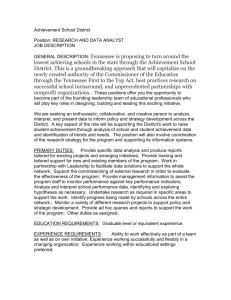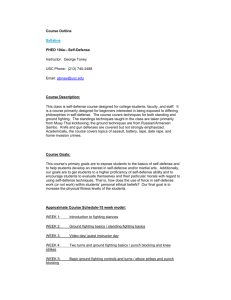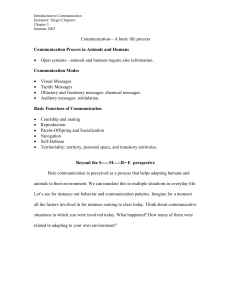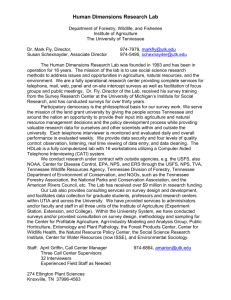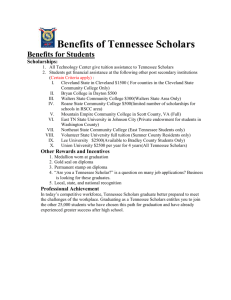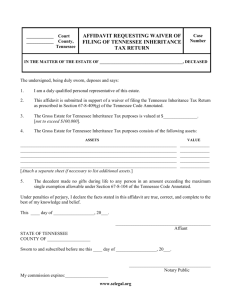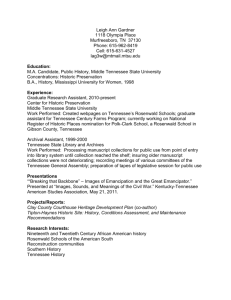self-defense in tn
advertisement
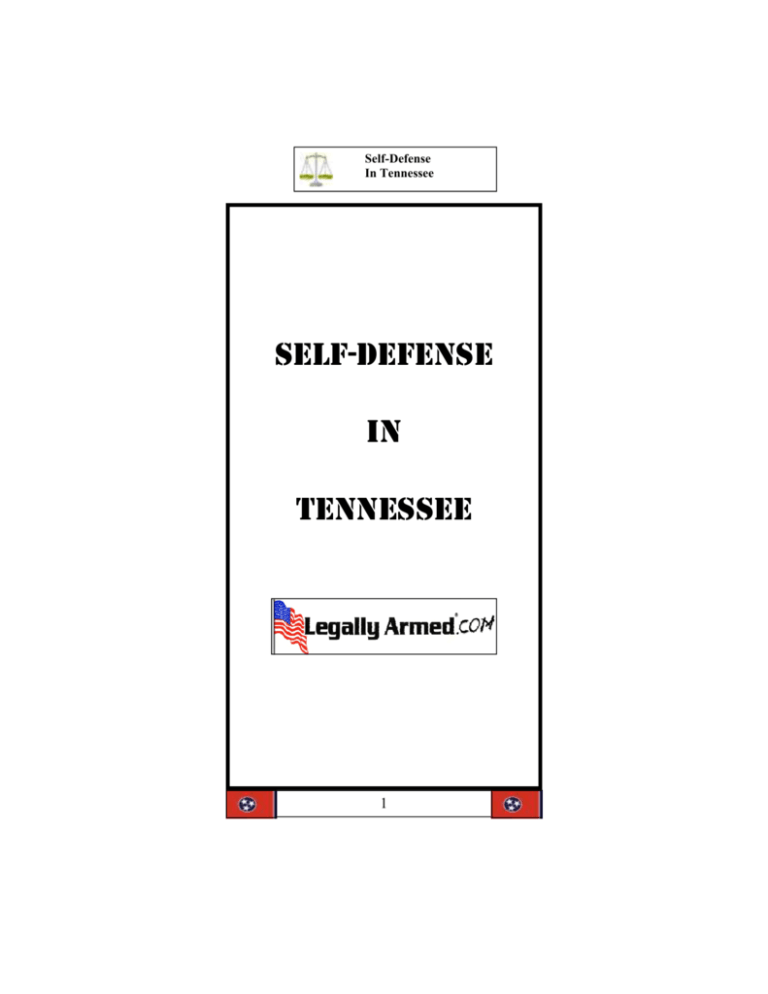
Self-Defense In Tennessee SELF-DEFENSE IN TENNESSEE 1 Self-Defense In Tennessee All questions regarding self-defense or the use of Lethal Force in Tennessee, should be sought from an attorney licensed to practice law in Tennessee. The writer of this p u b l i c a t i o n Gene Kennedy, is not an attorney. 2 Self-Defense In Tennessee CONTENT New self-defense law Page 4 Summary of new law Page 10 Good Samaritan Law Page 14 Protection of Property Page 16 Protecting Home and Family Page 17 When the THREAT is Over Page 18 Elements of Self-defense Page 19 FEAR, & Self-Defense Page 22 Lethal Force Page 23 § 39-17-1322 Page 26 Conclusion Page 27 3 Self-Defense In Tennessee House Bill to Public Chapter PUBLIC CHAPTER NO. 210 HOUSE BILL NO. 1907 AN ACT to amend Tennessee Code Annotated, Title 39, Chapter 11, Part 6, relative to the use of self defense and deadly force. BE IT ENACTED BY THE GENERAL ASSEMBLY OF THE STATE OF TENNESSEE: SECTION 1 Tennessee Code Annotated, Section 39-11-611, is amended by deleting the section in its entirety and substituting instead the following: (a) As used in this section: (1) “Curtilage” means the area surrounding a dwelling that is necessary, convenient and habitually used for the family purposes and for those activities associated with the sanctity of a person’s home. (2) “Dwelling” means a building or conveyance of any kind, including any attached porch, whether the building or conveyance is temporary or permanent, mobile or immobile, which has a roof over it, including a tent, and is designed for or capable of use by people. 4 Self-Defense In Tennessee (3) “Residence” means a dwelling in which a person resides either temporarily or permanently, or is visiting as an invited guest, or any dwelling, building or other appurtenance within the curtilage of such residence. (4) “Vehicle” means any motorized vehicle that is self-propelled and designed for use on public highways to transport people or property. SECTION 2 (b) (1) Notwithstanding the provisions of § 39-17-1322, a person who is not engaged in unlawful activity and is in a place where such person has a right to be has no duty to retreat before threatening or using force against another person when and to the degree the person reasonably believes the force is immediately necessary to protect against the other's use or attempted use of unlawful force. (2) Notwithstanding the provisions of § 39-17-1322, a person who is not engaged in unlawful activity and is in a place where such person has a right to be has no duty to retreat before threatening or using force intended or likely to cause death or serious bodily injury if: (A) The person has a reasonable belief that there is an imminent danger of death or serious bodily injury; (B) The danger creating the belief of imminent death or serious bodily injury is real, or honestly believed to be real at the time; and 5 Self-Defense In Tennessee (C) The belief of danger is founded upon reasonable grounds. (c) Any person using force intended or likely to cause death or serious bodily injury within a residence, dwelling or vehicle is presumed to have held a reasonable belief of imminent death or serious bodily injury to self, family, a member of the household or a person visiting as an invited guest when that force is used against another person, who unlawfully and forcibly enters or has unlawfully and forcibly entered the residence, dwelling or vehicle, and the person using defensive force knew or had reason to believe that an unlawful and forcible entry occurred. (d) The presumption established in subsection (c) shall not apply if: (1) The person against whom the force is used has the right to be in or is a lawful resident of the dwelling, residence, or vehicle, such as an owner, lessee, or titleholder, provided such person is not prohibited from entering the dwelling, residence, or occupied vehicle by an order of protection, injunction for protection from domestic abuse, or a court order of no contact against that person; (2) The person against whom the force is used is attempting to remove a person or persons who is a child or grandchild of, or is otherwise in the lawful custody or under the lawful guardianship of, 6 Self-Defense In Tennessee the person against whom the defensive force is used (3)Not wit hstanding the provisions of § 39-17-1322, the person using force is engaged in an unlawful activity or is using the dwelling, residence, or occupied vehicle to further an unlawful activity; or (4) The person against whom force is used is a law enforcement officer, as defined in § 39-11-106(21), who enters or attempts to enter a dwelling, residence, or vehicle in the performance of his or her official duties, and the officer identified himself or herself in accordance with any applicable law, or the person using force knew or reasonably should have known that the person entering or attempting to enter was a law enforcement officer. (e) The threat or use of force against another is not justified: (1) If the person using force consented to the exact force used or attempted by the other individual; (2) If the person using force provoked the other individual's use or attempted use of unlawful force, unless: (A) The person using force abandons the encounter or clearly communicates to the other the intent to do so; and 7 Self-Defense In Tennessee (B) The other person nevertheless continues or attempts to use unlawful force against the person; or (3) To resist a halt at a roadblock, arrest, search, or stop and frisk that the person using force knows is being made by a law enforcement officer, unless: (A) The law enforcement officer uses or attempts to use greater force than necessary to make the arrest, search, stop and frisk, or halt; and (B) The person using force reasonably believes that the force is immediately necessary to protect against the law enforcement officer's use or attempted use of greater force than necessary. SECTION 3 Tennessee Code Annotated, Title 39, Chapter 11, Part 6, is amended by adding the following new § 39-11-622: (a) (1) A person who uses force as permitted in §§ 39-11-611-- 39-11-614, or § 29-34-201, is justified in using such force and is immune from civil liability for the use of such force, unless: (A) The person against whom force was used is a law enforcement officer, as defined in § 39-11-106(21) who: (i) Was acting in the performance of his or her official duties; and (ii) Identified himself or herself in accordance with any applicable law; or (iii) The person using force knew or 8 Self-Defense In Tennessee reasonably should have known that the person was a law enforcement officer; or (B) The force used by the person resulted in property damage to or the death or injury of an innocent bystander or other person against whom the force used was not justified. (b) The court shall award reasonable attorney’s fees, court costs, compensation for loss of income, and all expenses incurred by a person in defense of any civil action brought against such person based upon the person’s use of force if the court finds that the defendant was justified in using such force pursuant to §§ 39-11-611--- 39-11-614, or § 29-34-201. SECTION 4 This act shall take effect upon becoming a law, the public welfare requiring it. PASSED: May 3, 2007 APPROVED this 22nd day of May 2007 9 Self-Defense In Tennessee New Law ‘As written in the summary about HB1907 for the Tennessee State Legislature’: NEW LAW Under this bill, a person who is not engaged in unlawful activity and is in a place where such person has a right to be would have no duty to retreat before: 1. Threatening or using force against another person when and to the degree the person reasonably believes the force is immediately necessary to protect against the other’s use or attempted use of unlawful force; or 2. Threatening or using force intended or likely to cause death or serious bodily injury if the person has a reasonable belief that there is an imminent danger of death or serious bodily injury, the danger creating the belief of imminent death or serious bodily injury is real, or honestly believed to be real at the time, and the belief of danger is founded upon reasonable grounds. This new law addresses that there would be a presumption that a person who used force intended or likely to cause death or serious bodily injury within any residence or dwelling (as opposed to just that person’s own residence under the old law), held a reasonable belief of 10 Self-Defense In Tennessee imminent death or serious bodily injury to self, family, a member of the household, or a person visiting as an invited guest. This presumption would apply when the force is used against another person who is not a member of the person’s family or household an who unlawfully and forcibly entered the residence or dwelling. This presumption would also apply when the force is exerted within an occupied vehicle if: 1. The force is used against a person who unlawfully and forcibly enters the vehicle; 2. The person using defensive force knew or had a reason to believe that an unlawful and forcible entry occurred; and 3. Possession of the instrument used, if any, by the person to inflict defensive force did not violate any state or federal law. The presumption would not apply under the following circumstances: 1. The person against whom the force is used has the right to be in or is a lawful resident of the dwelling, residence, or vehicle; 2. The person against whom the force is used is attempting to remove a person who is in the lawful custody or under the lawful guardianship of the person against whom the defensive force is used; 3. The using force is engaged in an unlawful activity or is using the dwelling, residence, or 11 Self-Defense In Tennessee occupied vehicle to further an unlawful activity; or 4. The person against whom force is used is a law enforcement officer who enters or attempts to enter a dwelling, residence, or vehicle, in the performance of the officer’s official duties and the officer identified himself in accordance with any applicable law, or the person using force knew or reasonably should have known that the person entering or attempting to enter was a law enforcement officer. Under the new law, the threat or use of force against another is not justified: 1. If the person using force consented to the exact force used or attempted by the other individual; 2. If the person using force provoked the other individual’s use or attempted use of unlawful force, unless the person using force abandons the encounter or clearly communicates to the other the intent to do so and the other person nevertheless continues or attempts to use unlawful force against the person; or 3. To resist a halt at a roadblock, arrest, search, or stoop and frisk that the person using force knows is being made by a law enforcement officer, unless the law enforcement office uses or attempts to use greater force than necessary to make the arrest, search, stop and frisk, or halt, and the person using force reasonably 12 Self-Defense In Tennessee believes that the force is immediately necessary to protect against the law enforcement officer’s use or attempted use of greater force than necessary. The new law provides immunity from civil liability for a person who uses lawful force in defense of self, others, or property except when the force is used against a law enforcement officer acting in an official capacity who identified himself or when the person using the force knew or should have known that the person against whom force was used was a law enforcement officer. The court would award reasonable attorney’s fees, court costs, compensation for loss of income, and all expenses incurred by a person in defense of any civil action brought against the person based upon that person’s use of force if the court finds that the person’s use of force use justified. AMENDMENT 1 WAS ADDED AND THE HOUSE PASSED THE BILL AS AMENDED ON APRIL 26TH, 2007. AMMENDMENT # 1: Applies the presumption that a person who used deadly force against an intruder who is not a member of the person’s family or household and who unlawfully and forcibly entered the residence or dwelling held a reasonable belief of imminent death or serious bodily injury to situations where the intruder entered a motorized vehicle that is designed for use of public highways. This amendment specifies that civil immunity for 13 Self-Defense In Tennessee the use of justifiable force would not apply if the use of force resulted in property damage to or the death or injury of an innocent bystander or other person against whom the force used was not justifiable. Good Samaritan Law Residents of Tennessee are more prone to come to the aid of another person than some people who live in other states. Because of this, there is a law that people should be aware of. It was enacted in 1999 and called “The Good Samaritan Protection Act of 1999”. This law should be understood by the readers of this publication because it addresses harm or death upon the person committing a criminal act. SECTION 1: This act shall be known and may be cited as the “Good Samaritan Protection Act of 1999”. SECTION 2: Tennessee Code Annotated, Section 29-31-201, is amended by deleting that section in its entirety and by substituting instead the following: (a) Any person who is injured while committing a felony or attempting to commit a felony on the 14 Self-Defense In Tennessee real property of another is barred from recovery of actual or punitive damages resulting from injuries, either accidentally or intentionally inflicted by the owner, lawful occupier or tenant of such property, which the person receives while committing or attempting to commit a felony. (b) A person who accidentally or intentionally causes property damage to or inflicts injury or death upon the perpetrator of a criminal offense is absolutely immune from civil liability for or the payment of monetary damages from such person’s actions if at the time such damage, injury or death occurred: (1) The person was preventing or attempting to prevent the perpetrator from committing the offense or was apprehending the perpetrator of the offense; and (2) The perpetrator was committing one (1) or more of the offenses specified in subsection [c] [1]-[c] [9] or was attempting to commit one (1) or more of the offense specified in subsection [c][10]. The immunity conferred by this subsection shall only apply to property damage caused to or injury or death inflicted upon a perpetrator of an enumerated offense and only under the conditions set out in this subsection. Such immunity shall not be construed to extend to property damage caused to or injury or death inflicted upon a bystander or other person who is not the perpetrator of an 15 Self-Defense In Tennessee enumerated offense. The offenses for which such immunity applies are: (1) any criminal homicide, (2) Aggravated rape, (3) Kidnapping, (4) Aggravated kidnapping, (5) Especially aggravated kidnapping, (6) Especially aggravated burglary, (7) Aggravated robbery, (8) Especially aggravated robbery, (9) Carjacking, and (10)Attempt to commit first or second degree murder. Protection of Property Anyone who owns their own home or lives in an apartment, has at sometime has thought about a situation where they arrive at their residence and their property is being stolen. Can Lethal Force be used in this situation. Lets look at the Tennessee Statue. § 39-11-614: (a) A person in lawful possession of real or personal property is justified in threatening or using force against another when and to the degree it is reasonably believed the force is immediately necessary to prevent or terminate 16 Self-Defense In Tennessee the other’s trespass on the land or unlawful interference with the property. 1. The person reasonably believes the other had no claim or right when the other dispossessed the person; and 2. The other accomplished the dispossession by threatening or using force against the person. [c] A person is NOT justified in using deadly force to prevent or terminate the other’s trespass on real estate or unlawful interference with personal property. Protecting Home & Family Lets look at what is written in Tennessee Code Annotated, Vol. 7, Prevention and detection of crime page 10, # 7.: “A person has the right to protect his own home and family, to peace, order, and the observance of decent behavior in his own house and in the presence of his family; to eject a drunken, disorderly, and dangerous person from his house; to use all force that may be required for that purpose; and, if resisted and exposed to danger by the intruder, he may exercise his right of self -defense, and is under no obligation to retreat or escape from his own premises to avoid trouble. State v. Foutch, 96 Tenn. 242, 34 S.W. 1 (1896).” There is one aspect of self-defense that is 17 Self-Defense In Tennessee When The Threat is OVER clear. When the threat of great bodily harm or death is over, it is OVER! There have been some situations in Tennessee where a victim gave chase after a crime happened. Some of these people died as a result of giving chase. Some died at the hands of their attackers and, at least one died after being shot by mistake by law enforcement officers. Once again let us look at notes within the provisions of self-defense regarding “Notices To Decisions” Vol. 7, page 9, # 4, paragraph 2: “If any less injury than death or great bodily harm is feared or indicated by the circumstances, the plea of self-defense will not be sustained, though the degree of homicide may be reduced. Rippy v. State, 39 Tennessee, 217 (1858).”. If a person is robbed at gun point at his home or anywhere, and elects to chase after the assailant when the ‘threat’ is over, he is taking a chance that the law will still be on his side when he catches the assailant and, possible harms or kills the assailant. There have been a few situations where a victim chased after their attacker and, while threatening them with a lethal instrument, the attacker killed the person and claimed self-defense in the killing. It is better to let the people who wear the blue suits and a badge, go after the criminal. It is also safer for you. 18 Self-Defense In Tennessee Elements of Self-Defense Because Tennessee is full of hunters and almost 200,000 state residents who have a handgun permit, there is always the possibility that you might face a criminal charge if a firearm was used as a tool in a self-defense incident. This is especially true when there are no witnesses to what actually occurred. If an incident is not ruled justifiable, the possibility of a criminal trial is real. In a criminal trail a jury will decide the fate of the person. If a firearm was used, there will always be people on the jury who don’t think any citizen should take a life of another...period! Because of this, lets look at what a jury might consider or a Grand Jury as to the actions taken in a self-defense incident. REASONABLE: Will the majority of the Grand Jury members believe facing the same circumstances as the subject of the Grand Jury, the actions causing the injury or death of the other person were reasonable? IMMEDIATE: Was the threat of bodily injury or death imminent (about to occur or impending)? Did the assailant have the MEANS, OPPORTUNITY, and INTENT to cause harm or death? 19 Self-Defense In Tennessee LETS LOOK AT THESE AREAS MEANS: Did the assailant possess the means or ability to cause grave bodily harm or death? Did the assailant possess superior physical strength, or possess any weapons that could cause severe bodily injury or death? OPPORTUNITY: The assailant has opportunity if he or she is capable of causing immediate harm by the use of bare hands at a striking distance, using an impact weapons or edged weapon within conversational distances [usually 21 feet], or at any reasonable distance with a firearm. INTENT: The assailant acted in a manner that any reasonable person would assume demonstrated their intention to cause severe bodily injury or death. DISPARITY OF FORCE: This is an area that is looked at most times when a larger person attacks a smaller person. However, if the victim is a large burley man and he is attacked by a smaller man with a knife, some people will wonder why the larger man shot the smaller man. They think the larger man could have wrestled the knife away from the smaller man. This is seen a lot in movies but, in real life, a knife can do a lot of harm. Disparity of Force can work for and against any legally armed citizen. 20 Self-Defense In Tennessee What if there were NO weapons used against a victim in a self-defense incident? Lets look at what is written regarding self-defense in Vo. 7, page 9, Tennessee Codes Annotated 38 -2-102 [Notes To Decisions} # 3: “Use of Deadly Weapons” “Where great bodily violence is being threatened or inflicted upon a weak person by one much stronger and heavier, with his fists, and with such determined energy that the person assaulted may reasonably apprehend death or great bodily injury, he is justified in using a deadly weapon upon his assailant. It makes no difference whether the bodily violence is being inflicted with a bludgeon or with the fists of an overpowering adversary of superior stren gth and greater si ze. State v. Bowling, 3 Shannon’s Cases 110 (1880)” Lets look at what is written in the Tennessee Codes: page 9 # 4: Killing in Self-Defense: “A killing, warranted as in self-defense, must be done under an honest, existing, and well founded belief that it is absolutel y necessary in self-defense. Rippy v. State, 39 Tenn. 217 (1858), Draper v. Sttate, 63 Tenn. 246 (1864); Hull v. State, 74 Tenn. 249 (1880); Barnards v. State, 88 Tenn. 183, 12 S.W. 431 (1889).” 21 Self-Defense In Tennessee Fear & Self-Defense “The defendant must fear death or great bodily harm to warrant killing in self-defense. If any less injury than death or great bodily harm is feared or indicated by the circumstances, the plea of self-defense will not be sustained, though the degree of homicide may be reduced. Rippy v. State, 39 Tenn. 217 (1858).” “If the defendant was in danger of death or great bodily harm from his assailant, or if he was not in such danger, but honestly believed himself to be so, upon reasonable evidence gathered from all the surrounding circumstances as they appeared to him, and he really feared death or some great bodily harm from his assailant, and, acting under such fear, he killed his adversary, it would be justifiable homicide. Williams v. State, 50 Tenn. 376 (1871); Jackosn v. State, 65 Tenn. 453 (1873); Little v. State, 63 Tenn. 246 (1874); Taylor v. State, 74 Tenn. 234 (1880); Hull v. State, 74 Tenn. 249 (1880); Frazier v. State, 117 Tenn. 430, 100 S.W. 94 (1906); Cooper v. Stat, 123 Tenn. 37, 138 S.W. 826 (1911); Shermanv State, 125 Tenn. 19, 140 S.W. 209 (1911).” “The belief of the danger and the actual fear of it must exist at the very moment of the killing, though the danger need not exist and be imminent at the very moment of the killing, but if 22 Self-Defense In Tennessee the defendant honestly fears, from all the circumstances, that it will exist and be imminent in a few moments, he may anticipate it, and slay his assailant. Allsup v. State, 73 Tenn. 362 (1880); Hull v. State, 74 Tenn. 249 (1880)” How many times have you read about a police shooting were the person shot did not have a weapon but, some shiny object in his hands [example-keys). The officer fearing for his life shot because he thought his life was in danger. The officers fear at the time of the shooting is a large consideration regarding if it is a ‘justifiable’ shooting. The fear a person feels about great bodily harm to them or death at the time they killed their assailant, is a large part of self-defense. What should a person know about the use of Lethal Force? The best response to this question is what a “reasonable person” would have done in a similar situation. Would a “reasonable person” have used deadly force to protect against great bodily harm or death and the unlawful use of deadly force against them? There are three areas that allow people [not employed in law enforcement], to use Lethal Force. These are: 1. Self-defense, 2. Defense of another person, 3. Prevention of certain crimes. 23 Self-Defense In Tennessee Are there specific areas where lethal force may not be used? There are three (3) areas that the use of Lethal Force may not be used. These are: 1. WORDS may not hurt you. No matter what a person says [unless they are holding a gun to your head], or the insults they throw at you, these words will not cause you harm or death. You can walk away from words and you do not want to be in a position where you were part of the escalation of a conflict because you countered their words with your own. Walk, run, or drive away from this type of situation. 2. You are the AGGRESSOR or you caused the altercation. In these situations, you cannot claim self-defense unless, you have withdrawn from the situation or told the other person that you wanted to stop but, the other person continued to escalate the attack. 3. Your arrested by a LAW ENFORCEMENT OFFICER. You do not have the right to resist even if it is a bad arrest [the officer made a mistake believing you committed a crime). The only exception to this rule is where “excessive force” is used against you. NOTE: If this happens, it is better to take the beating and complain later after you have your teeth replaced. 24 Self-Defense In Tennessee Are there areas that could adversely affect a victim who uses Lethal Force? If an innocent person is harmed or killed by your actions during the course of self-defense, there could be criminal and civil penalties. Also, if you come to the aid of someone you believe is in danger but, you were mistaken about the circumstances, you could have a problem. An example: A person is driving home when he notices one man beating another man with a bat. He thinks he needs to go the aid of the person being beaten. He gets out of his vehicle and tells the person with the bat to stop beating the man. Hearing this, the person with the bat gets off the man and advances to the driver. The driver who possess a Tennessee Handgun Permit, draws his pistol and tells the man not to advance any closer. When the man continues to advance, he is shot by the driver and falls. When police arrive, the find out that the man with the bat who was shot, was the victim. He was walking home when he was almost robbed with a person holding a knife [this was the man who was being beaten with the bat]. The victim who held the bat did not know the person telling him to stop hitting the other man was a Good Samaritan. He thought he was a partner of the person who tried to rob him. The person who came to the aid of the man being beaten, ‘the Good Samaritan’, was now the person in trouble. 25 Self-Defense In Tennessee If you see something happening that you feel you need to stop, make sure you know what is really going on. How many times do police officers get hurt during a call about domestic violence. Unless it is a situation where a child is involved or you know exactly what the situation is, it is better to be a good witness and call the police. No matter what you might face in a self-defense situation where the use of Lethal Force might be used, knowing when you can and cannot use Lethal Force is important. IMPORTANT There are references in the new self-defense law about § 39-17-1322. This law relates to the use of a firearm against a person committing a criminal act. It extends exemption to a person who used the firearm in self-defense or defense of a victim. Here is § 39-17-1322 (Afirmative Defense): “ A person shall not be charged with or convicted of a violation under this part if the person possessed, displayed or emplyed a handgun in justifiable self-defense or in justifiable defense of another during the commission of a crime in which that person or the other person defended was a victim. ” 26 Self-Defense In Tennessee CONCLUSION Again, fI am not an attorney and questions regarding Self-Defense and Lethal Force Laws in Tennessee should be directed to a Tennessee attorney. I tried to get a Tennessee Attorney to write this publication but, it never was done. I took it upon myself to address the issue. Firearms are addressed in this publication regarding Lethal Force but, a knife, a bat, an impact weapon, or a vehicle can all be used as a Lethal Weapon. The laws regarding the use of self-defense and the use of Lethal or Deadly Force, don’t care what the tool was that caused the harm or death of another person. Generally speaking, a person may use Lethal or Deadly Force only when a reasonable person would believe that Lethal or Deadly Force is IMMEDIATELY necessary to protect himself or herself or another person, from unlawful physical harm including deadly force. I hope this publication helps you understand the new Tennessee Self-Defense Law and, the use of Lethal or Deadly Force. Gene Kennedy 27 Self-Defense In Tennessee This ‘free’ publications is produced by: 28
